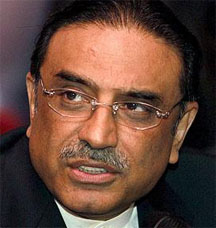ISLAMABAD (Reuters) – Pakistani President Asif Ali Zardari expressed full confidence yesterday in the country’s beleaguered prime minister, who is scrambling to prevent his government from falling after a key coalition partner quit.
Prime Minister Yusuf Raza Gilani’s US-backed government lost its majority in parliament on Sunday when the Muttahida Qaumi Movement (MQM) bolted to the opposition due to government fuel price policies it said were “unbearable” for Pakistanis.
Gilani’s government could fall if the divided opposition decides to pursue a no-confidence vote. Zardari’s backing yesterday suggested the president would not bow to any opposition pressure and push Gilani to seek a vote in parliament himself.
The upheaval coincides with increased US pressure on Pakistan to go after Islamist militant groups to help it turn around the faltering war in Afghanistan.
Washington said it would offer no comment on Pakistan’s coalition politics — an internal political matter – but suggested the turmoil should have no effect on the campaign against the militants.
“I can’t say at this point that the fact that they have this current political situation necessarily distracts them from… what else they’re doing,” State Department spokesman PJ Crowley told reporters. “We are going to continue to work with the Pakistani government.”
There has been speculation in the media that ties between Pakistan’s president and prime minister have grown strained, but both are from the same political party.

“(Zardari) has full confidence in Prime Minister Yusuf Raza Gilani and solidly stands behind him in foiling any attempt to destabilise the coalition government,” the presidential spokesman said in a statement.
It compounds the government’s difficulties in battling domestic militants and struggling to meet demands from the International Monetary Fund, including politically sensitive tax reforms, in return for an $11 billion loan.
Even before the latest setback, the government faced opposition from almost all political parties to its bid to implement a reformed general sales tax (RGST) — a key condition for the release of a sixth IMF tranche.
Analysts doubt Gilani will see out his term, which ends in 2013, but divisions within the opposition make it unlikely it will unite and form a new ruling alliance.
Former prime minister Nawaz Sharif’s Pakistan Muslim League (PML-N), the biggest opposition party in parliament, is expected to meet today to decide a course of action.
It is likely to be the pivotal force in determining the government’s fate, as it is the only opposition party with the numbers to force a no-confidence vote on its own.
Following the defection of the MQM, the government is 12 seats short of the number needed to survive a no-confidence vote.
Were it to lose such a vote, the country would hold early elections. Gilani has been scrambling to win the support of opposition leaders to save his alliance.
“From this point onward, the government will be on crutches. The no-confidence vote is a threat for it,” said analyst Ahmed Bilal Mehboob.
The country’s main stock index ended 1.44 percent lower, in contrast with rising stocks elsewhere in Asia, reflecting concerns over the stability of the government, traders said.
Analysts say they do not expect the military to intervene, but do not rule it out if the situation degenerates. The military has ruled Pakistan for more than half of its history.
Some analysts said political trouble could prompt Washington to rely more on Pakistan’s military.
“Given the political upheaval inside Pakistan, then the only stable entity that remains is the military, so the US will put all its eggs in that basket, or wll be seen as putting its eggs in that basket,” said Shuja Nawaz of the Atlantic Council think tank.
Yesterday, exiled former President Pervez Musharraf said from Dubai that the new party he launced in October, the All Pakistan Muslim League (APML), stood ready to contest early elections if they came.
The MQM said its senators had submitted a motion seeking a rollback of fuel price rises, but had taken no decision on whether to press for a no-confidence vote.
Petrol prices were raised by 9 percent on January 1, adding to inflationary pressure in a country where frustration is spreading over poverty, corruption and power cuts.
While anger over fuel prices prompted the MQM to leave the coalition, it has been complaining for months that the government is not doing enough to improve security in its home base of Karachi, Pakistan’s financial capital and biggest city.
The MQM pulled out after Jamiat-e-Ulema-e-Islam (JUI), a pro-Taliban religious party, quit the coalition last month and went into opposition because Gilani sacked one of its ministers.
The party repeated its call for Gilani’s resignation and said it ruled out rejoining the coalition.
“Gilani has no moral grounds to stay in power. He should step down himself instead of someone else throwing him out,” said deputy party leader Abdul





